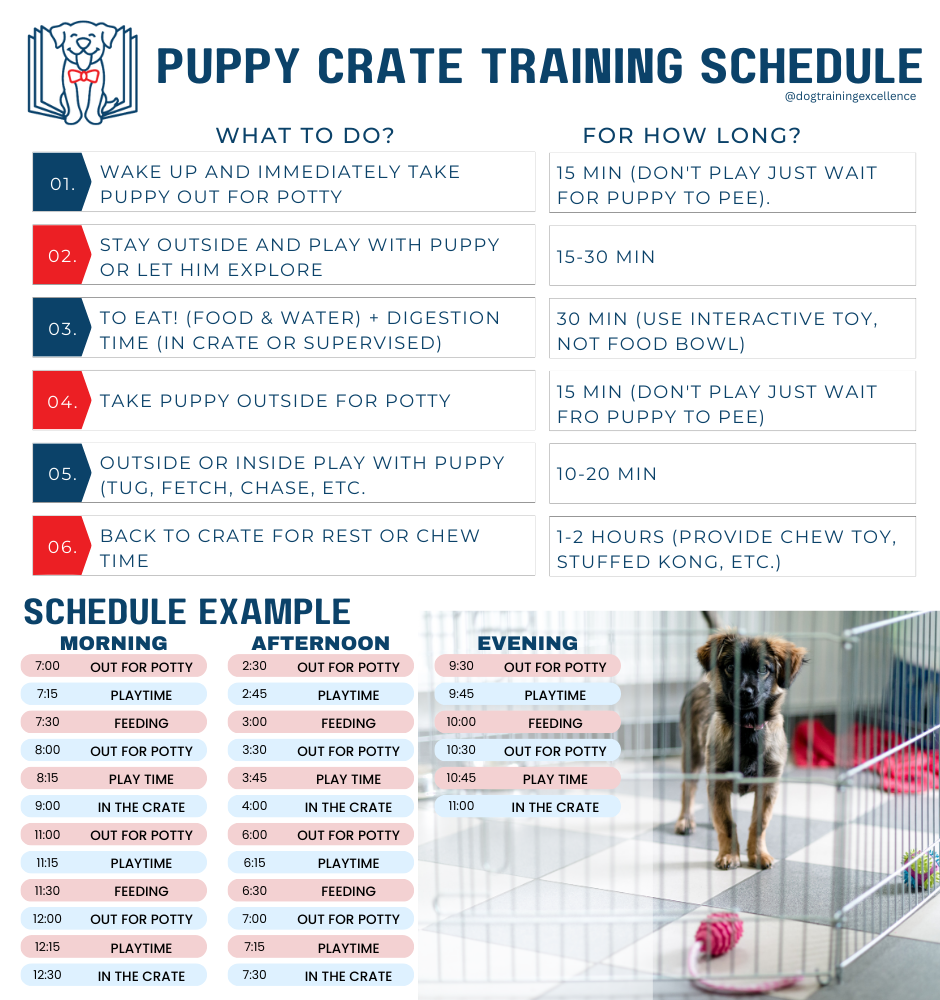
The Perfect Crate Schedule for Puppy: Solve Whining, Night Training & More
Estimated reading time: 8 minutes
Key Takeaways
-
- A crate schedule for puppy provides security and routine.
- Helps with housebreaking and prevents accidents.
- Reduces puppy whining in crate and destructive behavior.
- Includes a sample schedule for an 8-week-old puppy.
- Offers solutions for common crate problems.
Table of contents
Bringing home a new puppy is an exciting adventure—but it also comes with challenges like whining, potty accidents, and sleepless nights. The key to raising a well-behaved pup? A crate schedule for puppy.
Crate training isn’t just about confinement—it’s about creating a safe, structured routine that helps with housebreaking, prevents puppy whining in crate, and even stops excited peeing.
In this guide, we’ll break down:
- Why a crate schedule is essential
- A sample 8-week-old puppy schedule
- Nighttime kennel training tips
- Solutions to common crate problems
- Pro tips for long-term success
Let’s dive in!
1. Why a Crate Schedule is Essential for Puppies
A crate schedule for puppy isn’t just about convenience—it’s a training tool that benefits both you and your pup.
✔ Security & Routine
Puppies thrive on predictability. A consistent schedule reduces anxiety and prevents puppy whining in crate by teaching them when to expect play, rest, and potty breaks.
“A structured routine helps puppies feel secure, minimizing stress-related behaviors.” – Care.com
✔ Faster Potty Training
Puppies naturally avoid soiling their sleeping space. A crate encourages bladder control and reinforces outdoor elimination habits. For more on potty training, see our Ultimate Guide to Pet Training.
“Crate training is one of the fastest ways to housebreak a puppy.” – PAWS
✔ Safety & Preventing Destruction
When unsupervised, puppies chew, dig, and explore—often dangerously. A crate keeps them safe while you’re away. For tips on pet-proofing, check out Pet Safety: Securing Your Home.
“A crate prevents destructive behavior and keeps your puppy out of harm’s way.” – Diggs
2. Sample Puppy Schedule for 8 Weeks
An 8-week-old puppy needs frequent naps, meals, and potty breaks. Here’s a foolproof daily routine:
🌅 Morning Routine (6 AM–12 PM)
- 6:00 AM: Wake up → immediate potty break (puppies often pee right after waking).
- 6:15 AM: Breakfast → supervised play for 30 minutes.
- 7:00 AM: Crate nap (1 hour) → then another potty break.
“Young puppies need 18–20 hours of sleep daily—schedule naps to prevent overtired whining.” – Happy Hounds
🌇 Midday (12 PM–6 PM)
- 12:00 PM: Lunch → short play session.
- 12:30 PM: Crate nap (1–2 hours).
- 2:30 PM: Potty break → light play or training.
- Repeat every 2 hours to prevent accidents.
“Puppies can only hold their bladder for 2 hours max at this age.” – Orvis
🌃 Evening & Overnight (6 PM–6 AM)
- 6:00 PM: Dinner → calm play (avoid excited peeing).
- 7:00 PM: Crate rest while family eats.
- 8:30 PM: Final potty break → bedtime.
- Overnight: Set alarms for potty breaks every 2–3 hours.
For more on managing nighttime routines, explore our Senior Pet Care Guide for adaptable tips as your pup ages.
3. Step-by-Step Nighttime Kennel Training
Struggling with kennel training a puppy at night? Follow this routine:
🌙 Pre-Bedtime Wind-Down
- 8:00 PM: Low-energy play (no roughhousing).
- 8:30 PM: Final potty trip (wait until they fully empty their bladder).
“A calm pre-bed routine prevents overstimulation and whining.” – Happy Hounds
🛏️ Crate Setup for Success
- Place the crate in your bedroom (puppies feel safer near you).
- Add cozy bedding & a chew toy (no stuffing to avoid choking). For safe toy options, see Eco-Friendly Pet Toys.
4. Fixing Common Crate Training Problems
🚨 Puppy Whining in Crate
Causes & Solutions:
- Boredom: Give a stuffed Kong or chew toy.
- Separation anxiety: Gradually increase crate time. Learn more in Pet Mental Health Guide.
5. Pro Tips for Long-Term Success
🎉 Positive Reinforcement
- Reward calm crate entry with treats.
- Praise quiet behavior inside the crate.
“Make the crate a happy place with toys and rewards.” – Diggs
Frequently Asked Questions
How long can an 8-week-old puppy stay in a crate?
An 8-week-old puppy can typically stay in a crate for 2–3 hours max. They need frequent potty breaks and socialization.
What if my puppy cries all night in the crate?
Ensure they’ve had a potty break, the crate is comfortable, and it’s placed near you. Gradual training helps reduce whining.
When can I stop using a crate schedule?
Most dogs can transition out of a crate by 1–2 years old, depending on their behavior and training progress.
